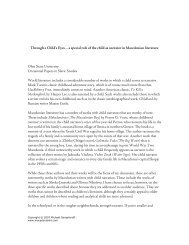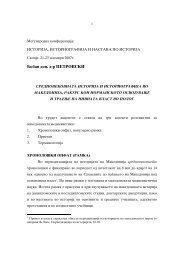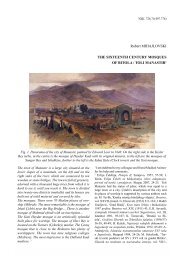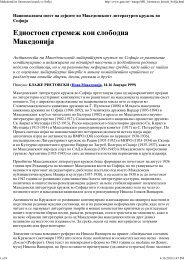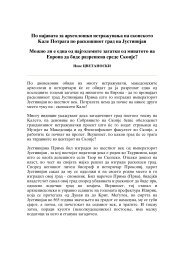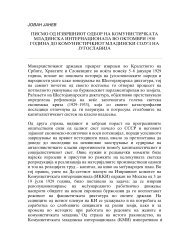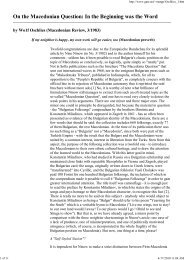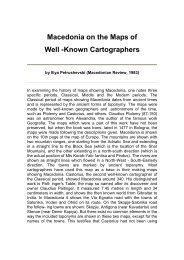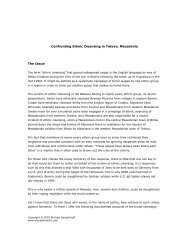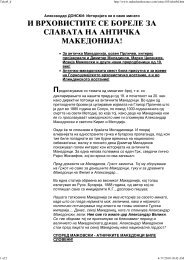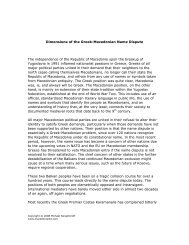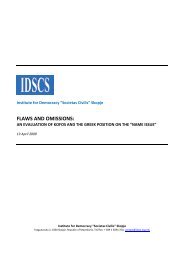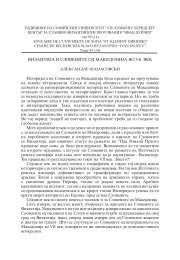Macedonian State-National Concepts and ... - Makedonika
Macedonian State-National Concepts and ... - Makedonika
Macedonian State-National Concepts and ... - Makedonika
Create successful ePaper yourself
Turn your PDF publications into a flip-book with our unique Google optimized e-Paper software.
to “the representatives of the great powers — signatories to the Treaty of Berlin”,<br />
the Club was shut down, the newspaper banned, <strong>and</strong> the main activists expelled<br />
from Serbia.<br />
At the time when a joint Slavonic association was active in the Russian capital<br />
(Slavjanskaja Beseda) <strong>and</strong> there were already established national societies of<br />
Czech, Bulgarian <strong>and</strong> Serbian young people, the <strong>Macedonian</strong> Scholarly <strong>and</strong><br />
Literary Society was founded in St Petersburg on October 28, 1902 (old style).<br />
Its principal objectives were the prevention of national disunion among the<br />
<strong>Macedonian</strong>s <strong>and</strong> the encouragement of their association “on the grounds of the<br />
unity of their fatherl<strong>and</strong>, their same descent <strong>and</strong> future, <strong>and</strong> also on the basis of<br />
joint study of their fatherl<strong>and</strong> from the historical, ethnographic, folklore <strong>and</strong><br />
linguistic points of view”. As early as November 12, 1902, the special Memor<strong>and</strong>um<br />
to the Russian government <strong>and</strong> to the Council of the St Petersburg Slavonic<br />
Charitable Society presented the most comprehensive <strong>Macedonian</strong> national programme<br />
for the winning of a “free Macedonia in political, national <strong>and</strong> spiritual<br />
respect” in order “to avoid antagonism among the Slavs from various areas of the<br />
Balkan Peninsula <strong>and</strong> to unite them into a single national-cultural whole”. It<br />
envisaged that in the initial period Macedonia was to be granted basic autonomous<br />
rights <strong>and</strong> freedoms in accordance with Article 23 of the Treaty of Berlin — where<br />
the <strong>Macedonian</strong>s would be recognized “as a separate people with a distinct literary<br />
language which will become, together with Turkish, the official language in the<br />
three vilayets of Macedonia: Kosovo, Bitola <strong>and</strong> Salonika,” <strong>and</strong> which would also<br />
involve “the recognition of an independent church”, with a governor-general from<br />
among the majority nationality <strong>and</strong> a deputy from the less numerous nationality,<br />
with a “regional elective popular assembly” as well as an “organic statute” from<br />
the Sultan which would be guaranteed “by the European great powers”, acting as<br />
an autonomous unit “like the province of Lebanon” within the borders of the<br />
Ottoman Empire. Yet “such a free Macedonia in its political, national <strong>and</strong> religious<br />
aspects,” says the memor<strong>and</strong>um, “will aim to attract the neighbouring states to it<br />
in a f e d e r a t i o n <strong>and</strong> fulfil its mission peacefully <strong>and</strong> quietly. In a word, only<br />
this kind of Macedonia can appear on the Balkan Peninsula in the role of a true<br />
P i e d m o n t for the unification of Balkan Slavdom <strong>and</strong> Orthodoxy.” On December<br />
29, 1902, the boundaries of that Macedonia were defined <strong>and</strong> it was decided<br />
to compile a parallel <strong>Macedonian</strong>-Bulgarian-Serbian-Russian dictionary in order<br />
to demonstrate to the Russians <strong>and</strong> foreigners that <strong>Macedonian</strong> was an individual<br />
<strong>and</strong> distinct language in the Slavonic group of languages.<br />
This programme was reflected in the Constitution of the <strong>Macedonian</strong> Scholarly<br />
<strong>and</strong> Literary Society of December 16, 1903. Article 12 officially introduced<br />
the <strong>Macedonian</strong> language into literary use for the first time, while Krste Misirkov<br />
carried out that decision in practice by the publication of his book Za makedonckite<br />
240



